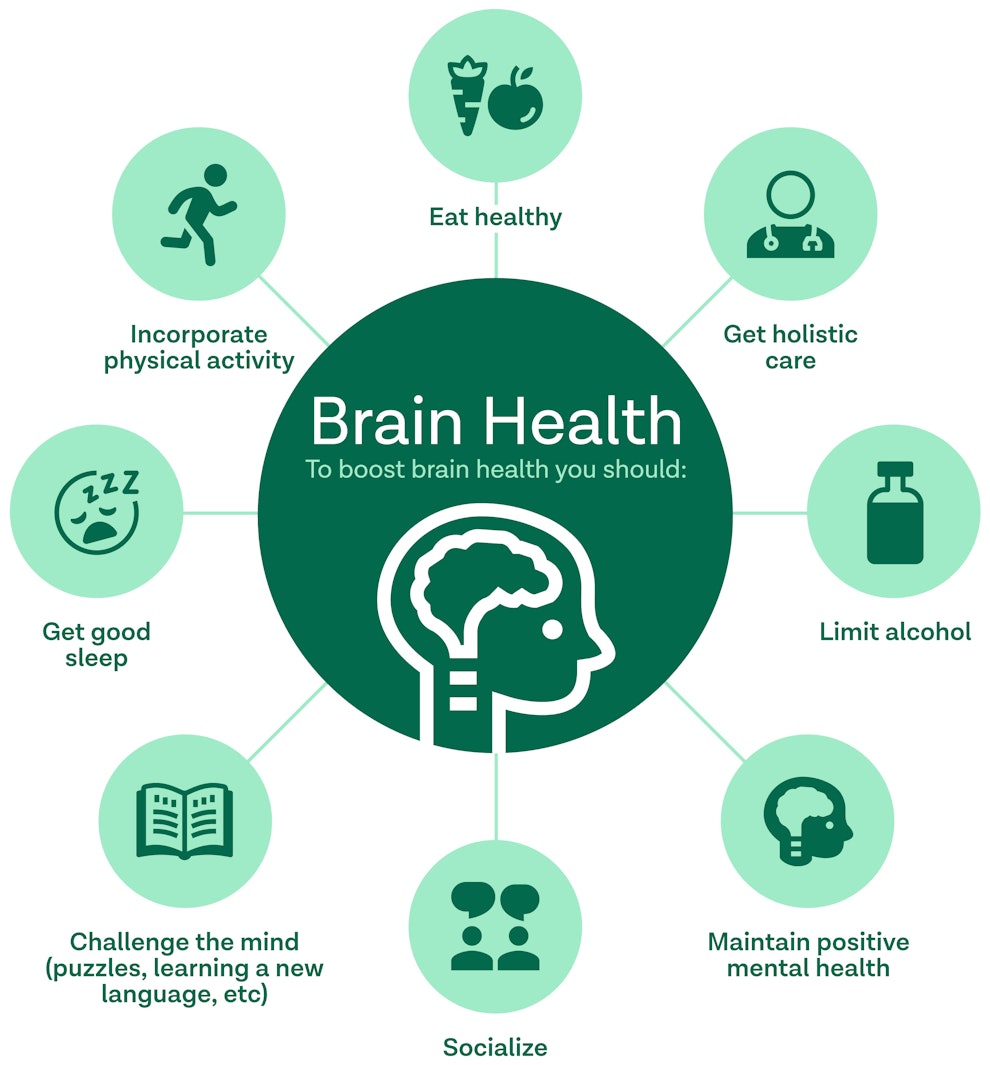11 Tips To Improve Brain Health For Seniors
Article at a glance
Brain health refers to the brain’s ability to function properly. This includes cognitive abilities, mental function, motor skills, and more.
While brain changes are a normal part of the aging process, cognitive decline is not.
There are a number of ways to preserve cognitive function, keep your brain healthy, and lower the risk of developing dementia and other neurodegenerative diseases.

Brain health is how well the brain is able to function in regard to cognitive, social-emotional, behavioral, and motor capabilities. Brain health also refers to the absence or the presence of neurological disorders.
A healthy brain is important for everyone, but brain health becomes a bigger concern as people age, particularly in regard to cognitive decline. In fact, the biggest risk factor for developing Alzheimer’s disease and other types of dementia is increasing age.
That said, engaging in healthy lifestyle habits can lower one’s risk for mental decline and keep their brain healthy during the course of their life. This article will explain how to improve brain health.

Understanding Brain Function: The Basics
The brain is the most complex structure of the human body. The brain is broken into various structures comprising brain cells and nerve cells that form neural pathways and networks responsible for all aspects of being alive.
Why is Brain Health Important?
Brain health is vital because the brain is the body’s command center, responsible for every aspect of being alive. This includes everything from perception to cognition to breathing. Because of this, it is absolutely essential to keep the brain as healthy as possible.
Risk Factors for Cognitive Decline
There are a number of risk factors for cognitive decline including aging, poor diet, and more. Read on below to learn more about each of these factors.
Aging
It is important to note that some mental decline is normal with aging. However, severe issues with mental functions are not.
One of the biggest risk factors for reduced cognitive function is increasing age. While old age is not a direct cause of dementia and other related neurodegenerative diseases, it is a major risk factor which is why it is never too early to focus on brain health and improve one’s cognitive functioning.
That said, a growing body of research is showing that making healthy lifestyle choices can help lower one’s risk of developing dementia and other issues in older age.
Other Risk Factors for Cognitive Decline
Other risk factors for cognitive impairment and other issues include:
Poor diet
Smoking
Brain injury
Sedentary lifestyle
Excessive alcohol consumption
Sleep issues
Social isolation
Depression
Stroke
Certain medications

Common Neurological Diseases
There are a number of neurological diseases which can cause cognitive issues that negatively impact brain health. Two of the most common for seniors are dementia and Alzheimer’s disease.
Understanding Dementia
Dementia is a group of degenerative neurological diseases marked by memory loss, impaired cognitive function, and more. One common type of dementia is Alzheimer’s disease.
Understanding Alzheimer’s Disease
Currently, there is no cure for Alzheimer’s which is why preventative lifestyle measures are so important, as healthy lifestyle modifications have been shown to decrease the occurrence of dementia.
Note: To learn more about Alzheimer’s disease and dementia, visit this resource.

How To Boost Brain Health: 11 Tips
According to the Alzheimer’s Association, a growing body of research shows that there are lifestyle habits people can implement to lower the risk of cognitive decline, keep their brains healthy, and improve memory. Certain habits include eating a healthy diet, staying active, and more.
- Eating Healthy
Consuming a healthy diet is imperative to keeping the brain functioning and healthy. One such diet to consider adhering to is known as the Mediterranean diet.
A large 2021 study found that the Mediterranean diet was inversely associated with dementia incidence. This means that those who adhere to this diet may be at a reduced risk for developing dementia.
The Mediterranean diet is comprised of food that is associated with Greece, Italy, and other countries that border the Mediterranean Sea. This includes:
Plant-based foods
Whole grains
Olive oil
Vegetables
Fruits
Nuts
Seeds
Legumes
Note: Learn more about healthy eating for seniors at this resource.
2. Taking Care of the Body
Taking care of the body as a whole is also important for the brain. This includes:
Regularly seeing a healthcare provider
Seeking medical treatment as necessary
Managing health conditions such as high blood pressure, high or low blood sugar, and high cholesterol properly
Getting regular exercise
Eating right
3. Staying Physically Active
Physical activity improves not only one’s physical health but also cognitive health. Studies have shown a link between regular exercise and a lower risk of cognitive decline. This is especially true for cardiovascular exercises that elevate the heart rate and increase blood flow to the brain.
Some options for exercising regularly include:
Taking a brisk walk outdoors (even better with a friend)
Riding a bike
Using an elliptical machine
Going for a run or jog
It’s important to note that local community centers like the YMCA or senior centers will have exercise classes that older adults are invited to participate in. To find a local center near you that offers classes, visit this source.
Note: Learn more about the benefits of physical activity, such as weight control and improved health conditions, at this resource.
4. Limiting Alcohol
Excessive drinking is a major risk factor for developing dementia. In addition to an increased risk of dementia, alcohol has a number of other negative consequences including high blood pressure, stroke, liver disease, digestive problems, social issues, and more. This is why drinking in moderation is so important.
According to the Centers for Disease Control and Prevention (CDC), moderate alcohol consumption is regarded as two drinks or less in a day for men or up to one drink in a day for women on days alcohol is consumed.

Socializing
Remaining socially active is incredibly vital for overall health and well-being. In fact, loneliness and social isolation are even linked to shorter life expectancy, cognitive decline, and other disabilities.
Some ideas for regular socializing include:
Schedule weekly phone calls with family and friends
Join a local club
Volunteer for an important cause
Take an educational class
Oak Street Health provides a community room where patients can interact, play games, or watch television together. Many local centers offer events for seniors to gather and interact so be on the lookout for local events where older adults can mix and mingle.
Note: Learn tips for coping with loneliness at this resource.
5. Maintaining Positive Mental Health
Mental health problems such as depression or anxiety tend to score poorly on cognitive function tests which is why managing mental illness is important.
Some ways to manage mental health include:
See a therapist
Take medications as prescribed
Exercise regularly
Talk to a loved one
6. Coping With The Aging Process
As people age, many life changes occur as a result including loss, loneliness, a potential loss of independence, and more. Speaking with your primary care physician or a therapist can be a good way to cope and manage the stress of these changes.
7. Find a Therapist in Your Area
Therapy can help people struggling with the aging process cope with the emotional toll of loneliness, loss, grief, and more. Below are some options for finding a therapist in your area:
8. Lowering Blood Pressure
High blood pressure is associated with a number of health conditions including heart disease, stroke, and more which is why keeping blood pressure in an ideal range is so important.
Note: Learn more about blood pressure by age at this resource.
9. Challenging the Mind
Another great way to improve cognitive health is through mental stimulation and keeping the brain active.
Some ways to challenge the mind include:
Learn a new language
Put together a puzzle
Take a class at a community college
Do something artistic
Play games
Do brain teasers like sudoku or crossword puzzles
Note: Learn more about challenging the mind and improving memory at this resource.

10. Sleeping Well
Sleep deprivation is detrimental to cognitive function and emotional health. Studies that investigated the impact of sleep deprivation on memory encoding and cognitive function found that sleep disruption may be associated with cognitive decline and aging due to its effects on the hippocampus, a brain structure heavily involved in memory and learning.
Some causes of sleep deprivation can include:
Sleep disorders, such as sleep apnea
Stress
Conditions that interfere with sleep, such as restless leg syndrome
Poor sleep habits
There are a number of ways to improve sleep hygiene including:
Stick to a regular sleep schedule and go to bed at the same time every night
Aim to sleep for 7–8 hours a night, not fragmented sleep periods of only a few hours
Skip napping in the late afternoon or early evening
Create a relaxing bedtime routine
Exercise regularly, but not three hours before going to bed
Don’t eat large meals close to going to bed
Watch caffeine and alcohol intake
Note: Learn more about improving and creating healthy sleep routines at this resource.
11. Managing Stress
High stress affects many facets of well-being including physical and mental health which is why it is imperative to reduce stress levels.
Note: Learn about behavioral health and stress management at this resource.
Some ways to lower stress include:
Exercise regularly
Talk to a loved one
See a therapist
Try mindfulness
Do yoga
Note: Learn more about the impact of minority stress at this resource.
FAQ
How can I keep my brain healthy in old age?
A few ways to improve your brain health as you age include staying physically active, challenging yourself mentally through games and puzzles, and getting enough sleep.
What are three ways senior adults can maintain cognitive function?
Three main ways seniors can maintain cognitive function improve proper nutrition, physical activity, and mental/social stimulation.
Sources
https://www.nia.nih.gov/health/cognitive-health-and-older-adults
https://www.health.harvard.edu/mind-and-mood/12-ways-to-keep-your-brain-young
https://www.alz.org/help-support/brain_health/10_ways_to_love_your_brain
https://www.alz.org/help-support/brain_health/stay_mentally_and_socially_active
https://www.cdc.gov/alcohol/fact-sheets/moderate-drinking.htm
Become a patient
Experience the Oak Street Health difference, and see what it’s like to be treated by a care team who are experts at caring for older adults.




